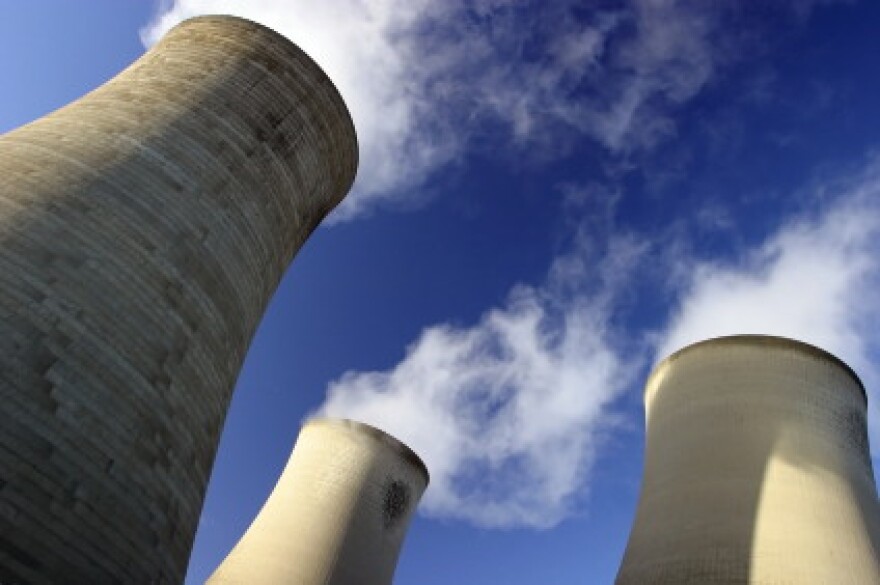The U.S. Nuclear Regulatory Commission is scrutinizing the V.C. Summer Power Plant in South Carolina more closely after it determined problems with a backup generator had not been properly identified and repaired by plant officials. V.C. Summer is located in Jenkinsville, South Carolina, less than a half hour from the state’s capital of Columbia. With one nuclear reactor, the plant has been cited for problems in the past but none have been serious enough to require evacuations of nearby residents. Sam Fretwell, an environment writer for The State newspaper in Columbia, explains why the NRC was concerned about the backup generator.
Sam Fretwell: This generator is one of two backup diesel generators. They're there to make sure that the nuclear plant maintains power in case they lose their normal power. This particular generator had some hiccups in it that raised concerns from the Nuclear Regulatory Commission.
Gwendolyn Glenn: And the NRC issued a white finding. What is the white finding?
Fretwell: They have five basic color codes for severity of violations. The least severe is a green, the most is a red. So the white is the next lowest. White is considered a moderate risk. They are not very commonly given out.
Glenn: So you said that this was one of two generators that the plant has. How important are these generators?
Fretwell: They're backup generators. So they're there in case something happens to the main power supply. They're very important to making sure that the plant continues to have power if the main supply goes out. That's important because you need power to keep the nuclear plant cool. And if it's not cool, then it can overheat and you can have radiation releases and that's not what you want to see happen.
Glenn: Was the other one working? And if there had been an emergency, would that have been sufficient to keep things cool?
[Read The State's story: SC nuclear plant draws federal scrutiny after atomic safety equipment sputters]
Fretwell: There was another one and it was working. The bottom line is that if you had a failure of main power and you had a failure of that one generator, the second generator would not have been available to take care of that. I mean, the big thing with nuclear plants is that they build on redundancies and they have all these backup systems. They're there in case of an emergency because nuclear power, while a reliable source of energy, can be a dangerous thing if it's not properly managed.
Glenn: In your reporting, I saw where it said it was not inherently dangerous. So although as you said, this was important to have it working properly, there was no danger to the public.
Fretwell: Yeah, that's right. Because the main power source was operating. This was a test. They were trying to see if this would work in case the main power source went out. So it wasn't a danger issue to the public. It is an issue of concern, though, because had you not had that main power, there could have been a problem.
Glenn: And from your reporting, I also understand that a concern of theirs was that this particular backup generator went unfixed for three weeks and January and February last year. So they knew about it but didn't fix it. Is that accurate?
Fretwell: Yes. And that's what the NRC documents show. And what it boils down to is the power company was saying, we think this thing will work, even though it's having these hiccups and problems. The NRC looked at it and said, we don't think it'll work. And their word is kind of the final say on that.
Glenn: And had it been taken care of at this point.
Fretwell: The company said it has. I think they also indicated that they were still doing some other work. They were a little vague about that. But the company says they have to straighten this out.
Glenn: Now, this plant has had other white findings issued by the NRC in the past. Have any of them been serious and been threats to the public?
Fretwell: I know one of the white findings was in 2006, and that had to do with a shipment of radioactive material in a package that had excessive radiation levels. It appears that it was resolved, but that's one of them. There was another one I found that was from 2009. It was talking about an inoperable turbine feed water pump. That, again, is something that makes the power plant work.
Glenn: Okay. And how important is this plant to that area? How much power does it provide?
Fretwell: That's a pretty major source of Dominion Energy mix here in South Carolina. Coal plants are on the way out because of the carbon emissions and the pollution that they're associated with them. Nuclear plants, despite some of these dangers, are seen as a way for power to be produced without carbon.
Glenn: And also this plant where it's located is also the site where they were going to add two more reactors. And that particular project was abandoned after billions was spent on it, correct?
Fretwell: That's correct. It was a major effort on the part of the power company at the time, SCG, and just was fraught with problems. And finally they just walked away from it. People were billed for this project before it was even built. So you had higher power bills for a project that never was finished.
Glenn: Anything else you like to add about this that I didn't ask?
Fretwell: You know, these issues are we try to point them out when they occur because nuclear plants, like I say, are important to the energy mix. But there can be some pretty substantial environmental problems if they're not operated properly. So we feel like it's important to point some of these things out.


